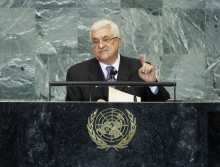The United Nations General Assembly (UNGA) on Thursday voted to upgrade the Palestinians’ UN status to non-member observer state, with concerns about the impact on the peace process emerging immediately. Furthermore, the status of US funding for the UNGA may also now come into question due to a previously passed law.
The UNGA vote to symbolically step up the Palestinian status won with 138 votes in favor, nine against and 41 abstentions. The United States was one of those casting no votes, with US Ambassador to the UN Susan Rice denouncing the UN vote as “counterproductive” and further placing “obstacles in the path to peace.”
In comments released by her office, Rice said the vote “should not be misconstrued by any as constituting eligibility for U.N. membership. It does not. This resolution does not establish that Palestine is a state.”
Thursday’s UNGA decision does not grant the same legal significance and backing for statehood that the Palestinians had sought last year in the UN Security Council. However, there are some who believe the move could be used by the Palestinians to gain acceptance into the International Criminal Court (ICC) and then pursue frivolous lawsuits against Israelis.
The UK decided to abstain from Thursday’s vote in part because the Palestinians did not assure them they would not take action at the ICC. UK Foreign Secretary William Hague was quoted by his office as saying they had wanted Palestinian President Mahmoud Abbas would “signal that the Palestinians would not immediately seek action in the International Criminal Court, which would be likely to make a return to negotiations impossible… In the absence of these assurances from President Abbas, the UK abstained on the vote.”
US Ambassador Rice further noted in her comments that the resolution will not change anything practically for the Palestinian people. “Today’s grand pronouncements will soon fade. And the Palestinian people will wake up tomorrow and find that little about their lives has changed, save that the prospects of a durable peace have only receded.”
Regarding the peace process, Rice expressed concern that the UN resolution handled a potential negotiated settlement one-sidedly, granting the Palestinians what they wanted and ignoring Israeli concerns.
“In many respects, the resolution prejudges the very issues it says are to be resolved through negotiation, particularly with respect to territory. At the same time, it virtually ignores other core questions such as security, which must be solved for any viable agreement to be achieved.”
Already a member of the US legislature, which has a law on the books that threatens to cut funding for UN agencies that take presumptive action on Palestinian statehood, has called for the funding of the UNGA to be cut.
US Rep. Ileana Ros-Lehtinen said on her Twitter page, “@UN agencies that grant membership 2 a Palestinian state must lose their U.S. funding (PERIOD) no ifs, ands, or buts!”
Israel was also troubled by the Palestinian vote. Prime Minister Benjamin Netanyahu’s office released a statement ahead of the decision calling it “meaningless.”
Netanyahu restated his call for a negotiated solution between the sides that protects the security of Israel. The statement said Netanyahu has “will not allow a base for Iranian terrorism to be established in Judea and Samaria [the West Bank], in addition to those that have [already] been established in Gaza and Lebanon.
“The way to peace between Jerusalem and Ramallah is in direct negotiations, without preconditions, and not in one-sided UN decisions. By going to the UN, the Palestinians have violated the agreements with Israel and Israel will act accordingly.”
Earlier Netanyahu issued a statement in which he reiterated that Israel is “prepared to live in peace with a Palestinian state”, but noted that in addition to safeguarding Israel’s security, the Palestinians “must recognize the Jewish State and they must be prepared to end the conflict with Israel once and for all.”
“None of these vital interests, these vital interests of peace, none of them appear in the resolution that will be put forward before the General Assembly today and that is why Israel cannot accept it,” said Netanyahu, who called the UN resolution “so one-sided” that it “doesn’t advance peace, it pushes it backwards.”
Lastly, Netanyahu noted that “as for the rights of the Jewish people in this land, I have a simple message for those people gathered in the General Assembly today: No decision by the UN can break the 4000-year-old bond between the people of Israel and the land of Israel.”
(By Joshua Spurlock, www.themideastupdate.com, November 29, 2012)

